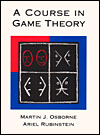| Since 2002 | ||||
|
Didactic Web-Based Experiments in
GAME THEORY
|
|||
|
Launched 1.1.02 |
|||
| Ariel
Rubinstein School of Economics, Tel Aviv University, and Department of Economics, New York University |
 |
Copyright © Ariel Rubinstein and Eli Zvuluny.
|
|
| The site's Main Aim is to provide the
teacher of a basic course in Game Theory with free user-friendly didactic
tools for conducting web-based thought experiments. After having registered, a teacher, will be able to allocate problems to the students and get basic statistics on their responses. The student can select the language of the problems from among eight languages: English, Portuguese, Spanish, French, Russian, Slovak. Finnish and Chinese |
||
| We welcome comments (brief ones
if possible) and especially suggestions for new experiments: |
||
| The idea of the site is
based on my experience in teaching a course in GT using web-based experiments
during the years 1988 to 1999. See; Rubinstein, Ariel, "Experience from a Course in Game Theory: Pre and Post-class Problem Sets as a Didactic Device", Games and Economic Behavior 28 (1999), 155-170 |
||
| This site is based on the perception
of game theory as the study of a set of considerations used
by individuals in strategic situations. Models are not seen as depictions
of how individuals actually play game-like situations and are not meant
to be used as the basis for a recommendation on how to play real "games".
My goal as a teacher is to deliver a loud and clear message that
game theoretic models are not meant to supply predictions of strategic
behavior in real life.
It is suggested that students be asked to complete two types of assignments: "post-class" problems, which are standard exercises found in any game theory text. Such problems should induce students to model verbal situations as games and investigate game theoretic solution concepts studied in class. And, "pre-class" problems, which are game theoretic problems of the type "imagine that you are participating in a game where... What will you play?" This site is designed to make it easy for a teacher to manage the assignment of pre-class problems. A teacher can assemble problems from the bank available on this site. The responses will be collected by the site and will be available only to the teacher. This allows a teacher to begin a lecture in possession of statistics regarding his class' results. The choice of problems was intended to show that while some of the results may fit the conventional analysis, others do not. This is in line with the idea that Game Theory is simply a collection of considerations which may or may not be used in real life. Note that the assignment of pre-class problem sets can help students
concentrate on examples discussed later in class. It is not a trivial
task for students to absorb several games in one class and this method
facilitates their understanding of the material. |
||
| A clarification of confidentiality
issues: An instructor will have access to a list of the students who have registered for his course and a list of completed problem sets for each student. Students will be asked whether they agree to participate in other experiments and will only be approached if they have done so. Information on the students and their responses will be kept confidential. A confirmed instructor will have also access to statistics on the responses of all students in all courses. We reserve the right to use the students' responses for academic research purposes. |
||
| The "philosophy" of this
site is promoted in the textbook: Osborne,
Martin and Ariel Rubinstein, A Course of Game Theory, MIT 1994. This book is aimed at the graduate as well as at advanced undergraduates levels. For the undergraduate level I recommend Martin Osborne, An Introduction to Game Theory, Oxford University Press, 2003. The logo of the site is taken from the cover of Osborne and Rubinstein (1994) designed by both of us (and I would like to thank Martin for allowing me to use the logo in this site). |
||
| Last and not least, the construction of the site was done with much devotion and imagination by Eli Zvuluny. | ||
|
Site Programming and Design |
